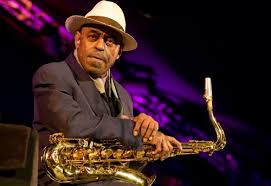The National Endowment of the Arts has doubled down on celebrating jazz beyond “jazz” — music that has exploded historic parameters or preconceptions of  “jazz” conventions — by naming as 2016 Jazz Masters the saxophonists Pharoah Sanders and Archie Shepp — both protégés of the late, great John Coltrane — and Gary Burton, an innovator of technique and content who’s embraced pop, country, folk and rock influences, studio experiments and classical finesse in creation of his own original sound, taken up with pleasure by musicians and listeners alike. Doing so, the governmental organization asserts that evolution as well as tradition is central to jazz’s DNA.
Wendy Oxenhorn, executive director of the Jazz Foundation of America is also a newly celebrated Jazz Master, awarded for her peerless advocacy since 2000 of musicians in need. This honor concedes that something other than what the government or market can do is essential in supporting American arts.
Both Sanders, now 75, and Shepp, 78, were ensemble members on Coltrane’s Ascension, arguably the “freest,” (most ambitiously seeking? unbridled? frenetic?) all- forces statement of their mentor’s life. Since Trane’s death in 1967, they’ve each had productive, creative, international careers.
Sanders’ early demonic energies drove the vocabulary of tenor and soprano saxes (and also piccolo!) into screeching, roaring, ripping timbres, unbreeched registers and sustained howls. He’s at his most extreme, in agony or ecstasy for an extraordinary seven minutes on “Crescent” from Offering: Live from Temple University, Trane’s last live recording from November 1966.  But since Sander’s breakthrough album under his own name, Tauhid, of that same year, he’s also generated serenity if not spirituality through “world music”-conscious modal improvisations.
Shepp has, over a career of 50 years, been an insightful, often acerbic social critic and a pioneering university professor as well as an challenging composer-performer. He made his first mark on jazz charging forth with a bristling hard tone and long, twisting lines on “Rufus (Swung His Face At Last To The Wind, Then His Neck Snapped)” — titled in reference to the precipitating tragedy of James Baldwin’s Another Country — splitting tracks with Coltrane on the 1965 album New Thing at Newport.
A participant in the musician-directed October Revolution and short-lived Jazz Composers Guild, his work such as Attica Blues, The Cry of My People and “Steam” have provocatively examined social themes. A man of many parts, Shepp evokes Ellingtonian elegance, maverick academic rigor, the essence of gospel and the blues, African roots and modern life in Paris. My favorite Shepp album — with fantastic arrangements, are they by Roswell Rudd who is just turning 80 and also deserves Jazz Master recognition?) — is The Magic of Ju-Ju.  Â
Burton, 72, has many distinctions. Born and raised in Indiana, he’s one of the first jazz stars to emerge from a formal jazz education context, having attended Boston’s Berklee College of Music in 1960 – ’61 and returning there as an important faculty member and administrator from 1971 to 2004. After working in Nashville early in his career, Burton conveyed some of its rural feeling, sense of space and open vistas in his progressive, small group mid ’60s albums like Tennessee Firebird and Duster. Inspired in part by pianist Bill Evans, Burton essentially invented a lush yet limber technique for vibes and marimbas dexterously using four mallets – which he’s deployed to great effect in duet albums with pianists including Chick Corea and Keith Jarrett.
Burton was an early explorer of overdubbing himself in layers (The Time Machine) and radical editing (“Lofty Fake Anagram“). He recorded with splendid bands including Roy Haynes, Steve Swallow, Carla Bley (on my long-ago favorite, Genuine Tong Funeral — with pseudonymously credited Pharoah?), Bob Moses and guitarists Larry Coryell, Jerry Hahn, Pat Metheny, Julian Lage, pianist Makoto Ozone — often spotlighting musicians on the move. Burton has been one of the first jazz musicians to discuss his homosexuality publicly, and he himself wrote Learning to Listen, an autobiography named 2014 Jazz Book of the Year by the Jazz Journalists Association.
Ms. Oxenhorn, since joining the Jazz Foundation in 2000 from her previous heroic job publishing Street News, has built the organization into the most significant and (sadly) necessary national network enabling and/or providing medical, housing, consulting and employment assistance as well as many personal services to an ever-increasing population of jazz people in duress. The JFA has a powerful board, noble founders to remember, a small, dynamic staff and a pantheon of donors, but it is Wendy Oxenhorn who brings them together for the benefit of the culture-makers, hence culture itself.
Nominations for 2017 Jazz Masters can be made by anyone until Dec. 31 2015. Besides Rudd, consideration must be extended to Dee Dee Bridgewater, Ernie Watts, Andrew Cyrille, Reggie Workman, Milford Graves, Ira Sullivan, Amina Claudine Myers, Charles Tolliver, Billy Harper, Oliver Lake, Junior Mance, John Scofield . . . Our country is rich in jazz masters, artists deserving wider recognition and rewarding audiences’ attentions.
howardmandel.com
Subscribe by Email |
Subscribe by RSS |
Follow on Twitter
All JBJ posts |
[contextly_auto_sidebar]


